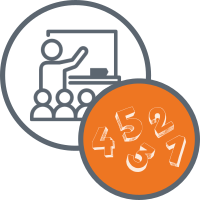You are here
Research and Practice Guides for Teaching Mathematics
Instructional Support Menu
Research and Practice Guides for Teaching Mathematics
CDE Research and Practice Guides
Systems of equations can be a challenging topic for a developing algebra student, yet the learning of methods to solve systems of equations has not been a topic of much research. Furthermore, the Colorado Academic Standards place the learning of systems of equations in both 8th grade and high school, and the progression of learning from one grade to the next isn't necessarily clear.
Area models can be used to represent many forms of two-factor multiplication, from elementary students' initial understandings of multiplication through high school students' work with factoring and dividing polynomials. In this video, area models are shown supporting students' understanding through an instructional approach called progressive formalization, where real-world contexts describing area are abstracted to area models as a way of supporting understanding of formal mathematics.
Word problems have an undeserved reputation within mathematics. With a better understanding of why people struggle with word problems and ideas for supporting them in instruction, word problems can be a useful tool for learning mathematics.
Practice Guides from the What Works Clearinghouse
The What Works Clearinghouse (WWC), part of the U.S. Department of Education's Institute of Education Sciences (IES), has published a set of Practice Guides with recommendations for educators to address challenges in their classrooms and schools. The guides are based on reviews of research and are written by panels of nationally recognized experts. The practice guides cover topics ranging from using technology, preventing dropouts, to using achievement data. The seven guides (as of Summer 2021) that directly address mathematics are:
- Assisting Students Struggling with Mathematics (March 2021)
- Teaching Strategies for Improving Algebra Knowledge in Middle and High School Students (Revised January 2019)
- Improving Mathematical Problem Solving in Grades 4 Through 8 (Revised October 2018)
- Teaching Math to Young Children (November 2013)
- Developing Effective Fractions Instruction for Kindergarten Through 8th Grade (September 2010)
- Assisting Students Struggling with Mathematics: Response to Intervention (RtI) for Elementary and Middle Schools (April 2009)
- Encouraging Girls in Math and Science (September 2007)
Research Briefs and Clips from the National Council of Teachers of Mathematics (NCTM)
The National Council of Teachers of Mathematics provides a set of Research Briefs and Clips to provide a foundation for understanding what research says about mathematics teaching and learning to a broad audience. The 26 guides (as of Summer 2021) include reviews on teaching specific content, effective instruction, assessment, selecting curriculum, working with dual-language learners, involving parents, homework, mathematics coaching, and video games.




Connect With Us





